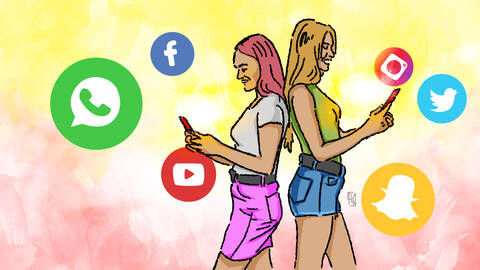Did Instagram dislike us self-centered?
- Louise Lavatine

- 16 avr. 2020
- 5 min de lecture

For some time now, Instagram has taken a big dimension in people's lives. From the moment you wake up, then throughout the day, including sometimes during lessons, work, meetings. A woman in her thirties reads her life through Instagram. However, she is not a person who publishes photos daily on her social networks, but she shares her report with this social network. She tells us that she feeds her "stories" account for her followers every day. She films her life and shares it instantly. She is paying more and more attention to its content with filters and other retouching devices. A concert, an exhibition, a dinner ... everything is a pretext for the subject. “I realize that this personal staging is a bit of narcissism. But I feel like I'm giving more intensity and resonance to what I'm experiencing. There is the everyday self and the one that I highlight on social networks. "
Mathilde is far from considering herself an extreme case. She recently attempted to cut the cord with Instagram. "I didn't last 48 hours ..." Seized by a feeling of emptiness, she saw herself not only losing the link with her "friends" but also depriving herself of all "likes". So satisfying for self-esteem. "If I do not have at least ten on a post, I live it a bit like a shame and I am able to remove it," she tells us.
I can see through this testimony to what extent social networks can make us dependent, from the emotions, the feelings they give rise to in each one but also to what point they can be a destructive source of the image we have of ourselves, due to this fear of being judged by our virtual community. A system that brings us to focus on our person.
Like Mathilde, have we all become addicted to these little sugars for the ego that we abundantly distribute on social networks? Facebook, Instagram, Snapchat, Youtube, Twitter. Each in its own way, these applications invite us to share our life. Keep an eye on these likes and the number of subscribers increasing or decreasing. An encouragement to constantly stage yourself and stay focused on yourself.
Should we rejoice or worry about it ? Do these digital tools promote creativity and self-expression by nurturing a form of healthy narcissism? Or do they weaken us by making us dependent on the gaze of others? The question divides. "Social networks are not at the origin of the development of narcissism, they just revealed it in broad daylight," said the psychiatrist Jean Cottraux, author of “Tous narcissiques” chez Odile Jacob. According to him, the phenomenon started from the 60s.
"In France the" prêches "of Françoise Dolto who encouraged parents to make their children self-absorbed, have largely contributed to idealizing them and making the Me generation first," he denounces.
However, narcissism is not a disease. Without it, we would not be doing great things. The philosopher Fabrice Midal even campaigned for further cultivation. "People do not suffer from loving each other too much, but from not respecting themselves enough by self-exploitation to the point of burnout," explains the author of Sauvez votre peau! Become narcissistic. Besides, for this essayist, there is a fundamental misunderstanding in the understanding of the myth of Narcissus. “The handsome young boy falls in love with his reflection in the water, but he doesn't know that it is him. History above all embodies the drama of self-ignorance. "In the process, Fabrice Midal denounces the current" ideology "which seeks to make the followers of the selfie feel guilty:" Recently I managed to make one with an artist whom I admire very much, the opera singer Ramon Vargas. I was particularly moved and happy to share this image with my friends on Facebook. Do I have to consider myself as egocentric? Why should only the powerful have the right to play with their image? Social networks have made it possible to democratize the exercise. And this is a good thing”
An analysis widely shared by Jean Cottraux: "Wearing a mask in society is very commonplace and did not start with Facebook. As for the desire to be "liked" for a post, it is in itself no more reprehensible than that of being congratulated by its guests after having received them for dinner. The selfies posted on social networks would therefore only be innocent manifestations of self-promotion putting a little balm in the heart.
Because on social networks we all tend to make an ideal, fantasized self. "The selfies that we post on our profile reassure us because they give us the impression of controlling our image," explains the philosopher and psychoanalyst Elsa Godart.
"This ideal me that we create tends to be tyrannical,"says Michael Stora. You have to feed it constantly which can quickly become exhausting. "
Only, "Staging our lives puts us at a distance. We end up being only the subject of our performances, ”warns Elsa Godart. With the risk of falling into overbidding.
The addiction probably comes from likes, the most perverse mechanism of social networks is this one. "They act like little dopamine shots and make us addicted very quickly," assures Guy Birenbaum. They were created for that. Ex-president of Facebook, Sean Parker explained last year that it was to encourage internet users to stay connected for as long as possible, the network designers
So how do we make sense of it? By checking that we keep our freedom in front of social networks.
And they don't take precedence over reality. Which implies knowing how to take a step back. "It is healthy, and even recommended, to learn to play with the image you project by using humor and second degree," says Michael Stora.Because we will not go back. "For everyone, this virtual self is becoming more and more a kind of self-extension", notes Elsa Godart, who does not say "not too worried about the future." I think that after the air brought about by these new exchange forums, behavior will eventually improve. When we see how they govern the lives of adolescents today who have blown up all the filters of intimacy one after the other, it is nonetheless questionable.
Instagram is a recent network and we don't always know how to approach it. You have to know how to distance yourself from it. It remains virtual, you have to know how to use it properly. It is not bad to feel pleasure in receiving likes and wanting to share moments of your daily life with our friends but it must not become vital and a drop in awareness make us lose ground. As for self-centeredness, Instagram is not at the beginning of anything, it just reveals it in broad daylight. What makes us suffer is not being focused on ourselves, it is actually forgetting ourselves. Because we focus on the image we want to send back and not the person we really are. My real self is sidelined. Narcissism is not bad, it is necessary to accomplish beautiful things, it becomes bad when our confidence is tangible and when a remark, a comment can become a source of pain.




I do not understand the title of the article, though.
Great article. Lots of very good thought on a complicated subject. Great to read it and discover your opinion. However, you must put links to the authors you are talking about and citing. They deserve that and it happens to be the law. :-)